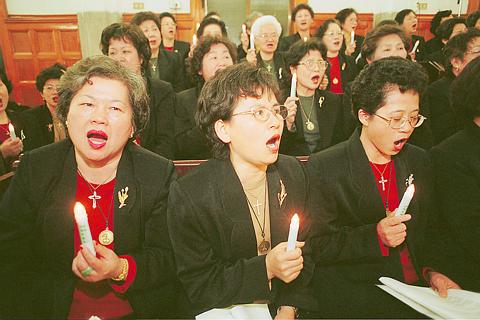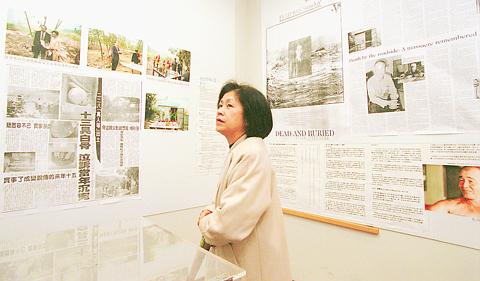Fifty-three years on, the events surrounding the 228 Incident of February 1947 still poison Taiwan's ethnic harmony.
The clash was primarily between mainlanders coming across from China in the aftermath of WWII and Taiwanese, whose ancestors had settled in Taiwan during earlier waves of migration.
A museum has been built as have memorials all over the island to commemorate the people who were killed or went missing during the violence of the events, but reconciliation still proves elusive.

PHOTO: GEORGE TSORNG AND CHIANG YING-YING, TAIPEI TIMESN
"If the public and the government see the 228 Incident as only a commemoration rather than as a starting point for the review of Taiwan's history, we will never learn the lessons [the event has to teach]," said National Taiwan University (NTU) historian Li Yung-chih (李永熾).
Facing up to history
Files referring to the 228 Incident were not released by the government until 1993 when the first official report -- A Research Report on 228 Incident (二二八事件研究報告), written by five historians -- was issued.

Some historians said that the report, which outlined the events that took place, was just the beginning.
"In terms of history, I don't think the government review was sufficiently careful," said Li, adding that a sense of "right and wrong" and the lessons the event might teach future generations were missing in the document.
However, the authors of the official report believe that the moral dimension is superfluous, saying that people make progress by learning from their mistakes.
"Since the government has apologized to victims' families, the priority for us now should be to eliminate the misunderstanding left by the tragedy between the two groups -- mainlanders and Taiwanese," said Huang Fu-san (黃富三), historian from the Academia Sinica and co-author of the official report.
Mutual suspicion
Huang said that the 228 Incident could be attributed to the different living standards in China and Taiwan at the time.
"Taiwanese were disappointed by the undisciplined and lawless troops from China," said Huang, adding that Taiwanese had by then been schooled in honesty and civic virtue by the Japanese colonial government.
Huang said that the two groups, mainlanders and Taiwanese, had been inadvertantly hurting each other's interests when the 228 Incident burst out in 1947, and the military repression that followed resulted in more misunderstanding and conflict.
"Mainlanders had access to more resources because [government] policies favored them," said Huang. "This established the superiority of the migrant mainlanders over Taiwanese."
Huang said that it was understandable that some Taiwanese held a grudge against mainlanders.
"The loss of many key [government] files, such as those relating to the many intellectuals killed during the 228 Incident, has resulted in a strong distrust of both the government and mainlanders," Huang said.
Some historians say the mutual suspicion that exists between the two ethnic groups has become an obstacle to consensus on Taiwan's identity -- whether it should be an independent country or just a part of China -- and this has not helped harmony among groups living in Taiwan.
"When mainlanders, who feel insecure, don't trust Lee Teng-hui (李登輝) because of his Taiwanese background, some Taiwanese advocate Taiwan independence based on memories left by the 228 Incident and later the White Terror (白色恐怖, a witch-hunt for political dissidents)," said Huang.
Honest history
Some historians suggest that uncovering and facing up to the facts of history is the only way out.
"Since the government, society and the media, have never had a clear interpretation of precisely what the White Terror was, the real face of history was hidden for decades," said NTU historian Li.
"Nowadays every political figure, when under pressure from others, always claims that he or she is a victim of `political persecution,' but this is nonsense," Li said, adding that the countless victims of political persecution were arrested without evidence and sentenced secretly after the 228 Incident.
"It's ironic that James Soong (宋楚瑜, an independent presidential candidate), who claimed that telephone lines at his campaign centers were wire-tapped, called himself a victim of the White Terror, Li said, adding that the White Terror created an atmosphere of fear.
"Ubiquitous monitoring networks setup by intelligence units confined people both spiritually and physically, and made them fear to say a word about politics," Li said.
Giving Taiwan priority
Li suggested that textbooks have to be revised to provide future generations with a deeper understanding of Taiwan's history.
"If the government could face the history, with all its right and wrong decisions and tell our children the truth, then future generations living on the island would not feel so confused," Li said, adding that Taiwan should be given priority over China in this process.
Historian Huang from the Academia Sinica agrees with Li, saying that stressing the history of Taiwan in textbooks would adjust long-term aberrations in Taiwan's history education.
"The differences among groups in Taiwan could push progress forward as long as all groups, mainlanders, Taiwanese, Hakka people and Aborigines all identify themselves as an important part of this land," Huang said. "Every group should be confident that its existence in Taiwan is a positive factor."

DAREDEVIL: Honnold said it had always been a dream of his to climb Taipei 101, while a Netflix producer said the skyscraper was ‘a real icon of this country’ US climber Alex Honnold yesterday took on Taiwan’s tallest building, becoming the first person to scale Taipei 101 without a rope, harness or safety net. Hundreds of spectators gathered at the base of the 101-story skyscraper to watch Honnold, 40, embark on his daredevil feat, which was also broadcast live on Netflix. Dressed in a red T-shirt and yellow custom-made climbing shoes, Honnold swiftly moved up the southeast face of the glass and steel building. At one point, he stepped onto a platform midway up to wave down at fans and onlookers who were taking photos. People watching from inside

A Vietnamese migrant worker yesterday won NT$12 million (US$379,627) on a Lunar New Year scratch card in Kaohsiung as part of Taiwan Lottery Co’s (台灣彩券) “NT$12 Million Grand Fortune” (1200萬大吉利) game. The man was the first top-prize winner of the new game launched on Jan. 6 to mark the Lunar New Year. Three Vietnamese migrant workers visited a Taiwan Lottery shop on Xinyue Street in Kaohsiung’s Gangshan District (崗山), a store representative said. The player bought multiple tickets and, after winning nothing, held the final lottery ticket in one hand and rubbed the store’s statue of the Maitreya Buddha’s belly with the other,

‘NATO-PLUS’: ‘Our strategic partners in the Indo-Pacific are facing increasing aggression by the Chinese Communist Party,’ US Representative Rob Wittman said The US House of Representatives on Monday released its version of the Consolidated Appropriations Act, which includes US$1.15 billion to support security cooperation with Taiwan. The omnibus act, covering US$1.2 trillion of spending, allocates US$1 billion for the Taiwan Security Cooperation Initiative, as well as US$150 million for the replacement of defense articles and reimbursement of defense services provided to Taiwan. The fund allocations were based on the US National Defense Authorization Act for fiscal 2026 that was passed by the US Congress last month and authorized up to US$1 billion to the US Defense Security Cooperation Agency in support of the

HIGH-TECH DEAL: Chipmakers that expand in the US would be able to import up to 2.5 times their new capacity with no extra tariffs during an approved construction period Taiwan aims to build a “democratic” high-tech supply chain with the US and form a strategic artificial intelligence (AI) partnership under the new tariffs deal it sealed with Washington last week, Taipei’s top negotiator in the talks said yesterday. US President Donald Trump has pushed Taiwan, a major producer of semiconductors which runs a large trade surplus with the US, to invest more in the US, specifically in chips that power AI. Under the terms of the long-negotiated deal, chipmakers such as Taiwan Semiconductor Manufacturing Co (TSMC, 台積電) that expand US production would incur a lower tariff on semiconductors or related manufacturing